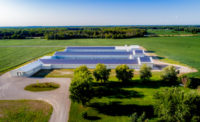Aleph Farms, Israel, completed its first slaughter-free meat experiment on the International Space Station, 248 miles away from any natural resources. Through an international collaboration with 3D Bioprinting Solutions, Russia, which develops implementations of 3D bioprinting technologies; Meal Source Technologies; and Finless Foods, Emeryville, Calif., Aleph Farms, co-founded the food-tech incubator The Kitchen to enable unconditional access to safe and nutritious meat anytime, anywhere, while using minimal resources.
Aleph Farms’ production method of cultivated beef steaks relies on mimicking a natural process of muscle-tissue regeneration occurring inside the cow’s body, but under controlled conditions. The framework of this experiment, which took place Sept. 26 on the Russian segment of the ISS, established a proof of concept in assembling a small-scale muscle tissue in a 3D bioprinter developed by 3D Bioprinting Solutions under micro-gravity conditions. This cutting-edge research serves as an essential growth indicator of sustainable food production methods that don’t exacerbate land waste, water waste or pollution.
“In space, we don’t have 10,000 or 15,000 liters of water available to produce 1 kg of beef,” says Didier Toubia, co-Founder and CEO of Aleph Farms. “This joint experiment marks a significant first step toward achieving our vision to ensure food security for generations to come, while preserving our natural resources.”
“The mission of providing access to high-quality nutrition anytime, anywhere in a sustainable way is an increasing challenge for all humans,” adds Jonathan Berger, chief executive officer of The Kitchen. “On Earth or up above, we count on innovators like Aleph Farms to take the initiative to provide solutions to some of the world’s most pressing problems, such as the climate crisis.”



